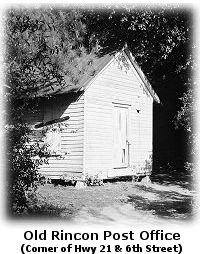Once a small, turn-of-the-century railroad town, Rincon now thrives as a vital part of Effingham County’s economic growth and development, and provides its residents with the kind of community they can be proud to call home…
- Largest municipality within Effingham County
- Voted 6th safest city in Georgia for 2025 - See More
- Council/manager form of government
- Provides high level of resident services with no current city property taxes
- Strives to remain an efficient city government by providing continuous training for city staff
- Lowest city service fees within the county (water, sewer, building fees, etc.)
- Acquired new city hall without having to implement property taxes
- Police response time of less than 3 minutes
- Rapidly growing Recreation Department
- Best equipped fire department in the county
History
Just before the turn of the century, the city of Rincon sprang up around the miles and miles of railroad tracks making their way along the eastern seaboard through the sleepy countryside of rural Georgia. It had taken more than 150 years for residents to move beyond the original 1751 Salzburger New Ebenezer settlement along the Savannah River, but once the railroad came to town, a new city and a new era had arrived.

Chief Engineer George Wadley named the newly founded city Rincon, which was Spanish for “little spot” or “corner.” Aptly named, Rincon began as just a small area in the county named for Lord Effingham, a former member of the House of Lords in England. Businesses soon began popping up, managed by area natives and created to meet the needs of the railroad workers, followed by houses and various churches. Successful local businesses became the order of the day.
Echoing the line-and-grid street system of Savannah, Rincon systematically marched its way along the tracks and settled itself in an organized, orderly fashion. Serenaded by wistful train whistles and lulled to sleep by the steady clackety-clack of train cars on the rails, residents of the “little spot” of Rincon found a place they could call home.
Sawmills, cotton gins and turpentine stills dotted the landscape, providing additional means for business opportunities. Early landowners saw potential in the railroad and granted rights of way for its progression. Economic growth and development resulted, and the city of Rincon was incorporated August 3, 1927.
As a fledgling city in the late 1920s, Rincon elected Frank Bowers as its first mayor. The new government disbanded in 1929 but reactivated in 1954 and reconstituted its city governmental structure. The population was around 500. Although it later grew to be the largest municipality in Effingham, Rincon’s hometown atmosphere revolved around locally-owned businesses, strong community and civic organizations, and family-focused activities.
Life in Rincon continued at a slow and steady pace until the early 1980s. The city experienced a dynamic growth spurt with the arrival of large industrial and retail companies both within and just beyond Rincon’s city limits. Rincon had once again “arrived.”
The City of Rincon now is home to more than 10,000 people and a wide array of small local businesses, large retail outlets, restaurants, grocery stores and gas stations. Although more commonly used by larger cities, the council-manager form of government allows Rincon to effectively administer the vast number of services it provides.
Public services, infrastructure and great potential for quality residential and business development abound in what began as a small stop along a turn-of-the-century railroad line. By focusing on the incorporation of both hometown traditions and progressive yet balanced growth, the City of Rincon makes its community more than just a great place to work and live. It makes Rincon a great place to call home.
(Historical Sources: Springfield Herald, 50th Anniversary Edition, October 1958; City of Rincon archives)